 Top 5 Adaptogens for Stress Reduction
Top 5 Adaptogens for Stress Reduction
Adaptogens are specific plants and herbs that help the body deal with stress and balance its physiology. Hans Selye, the scientist who pioneered our modern understanding of stress, once said: “It is not stress that kills us; it is our reaction to it.” (1)
Your stress response determines whether you wither or grow in the face of challenges in every facet of your life–work, health, relationships, and personal development. Now more than ever, it’s vital to have a robust response to stress to thrive in life.
The fast pace of life in the 21st century probably won’t slow down any time soon, so what’s the secret to achieving resilience? Enter adaptogens. These herbs and plants are recognized for their unique medicinal properties, and they all have one thing in common: they help your body and mind cope with stress.
Keep reading to learn the top five adaptogens for stress reduction, how and why to use them, and where they fit into a healthy lifestyle.
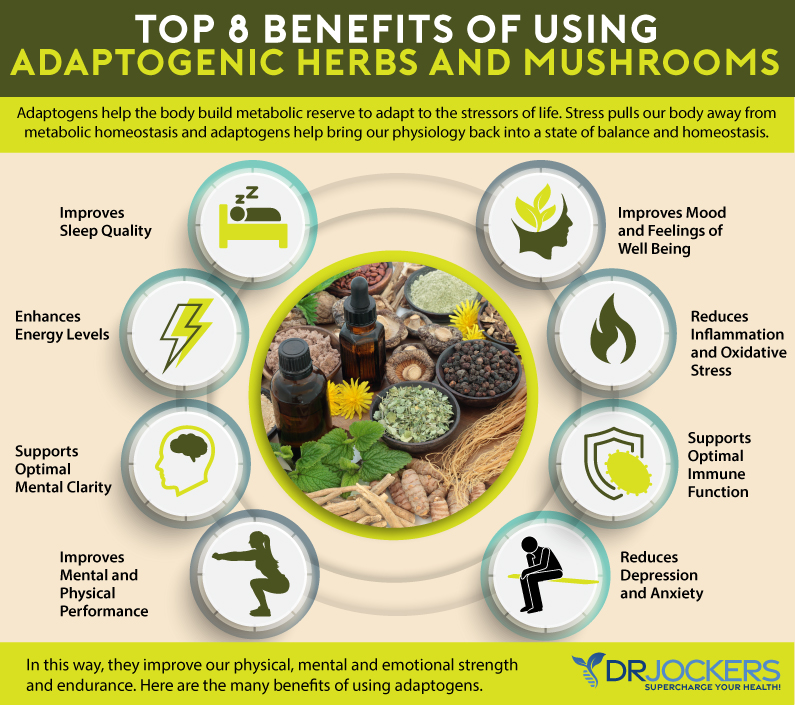
What Are Adaptogens?
The word “adaptogen” has only been around since 1947, but the underlying concept dates back thousands of years in traditional herbal medicine systems around the globe (2).
To be considered an adaptogen, a substance must(2):
- Increase the stress resistance of an organism in a non-specific way
- Promote homeostasis
- Be non-toxic, or nearly so
Let’s unpack the meaning of all that. Essentially, adaptogens increase your general resistance against multiple types of stress and help keep your body in a state of balance or harmony, safely and without side effects.

How Do Adaptogens Work?
Adaptogens are said to decrease fatigue, boost strength and vitality, mitigate the damaging effects of stress, and aid in recovery from any number of maladies.
While these claims might raise an eyebrow or two, real scientific evidence affirms the validity of adaptogens. Studies suggest that adaptogens do indeed work through general (rather than specific) mechanisms, which explains the wide range of health benefits.
The following pathways are common to most of the adaptogens you’ll learn about in the next section(3):
- Reducing cortisol, the “stress hormone”
- Stimulating or enhancing central nervous system function
- Reducing inflammation and balancing the immune response
- Protecting cells and organ systems (such as the central nervous system, liver, heart, circulatory system, and gut) (3)
Whereas most modern medicines exert a very precise and narrow effect in your body, you can think of adaptogens as having a much broader target, similar to a shotgun blast.

The 5 Best Adaptogens for Stress Relief, According to Science
Here are 5 of the most well studied adaptogens that have been shown in the science to consistently and effectively improve our response to stress. You can try using 1 or 2 of these or all 5 and see how your body does with them. There are many other adaptogens that have tremendous benefits but I don’t think you will see a lot of benefits from a few or all of these.
#1: Ashwagandha
Ashwagandha, the Sanskrit name for the root of Withania somnifera, loosely translates to “horse essence.” The name is a play on words, because the powdered root not only smells slightly like a horse, but is also said to provide the strength and vitality of a horse to those who take it.
This root has a 6000 year history of use in the Ayurvedic medical tradition for reducing stress and anxiety and healing inflammatory diseases (4). According to a 2012 randomized, controlled trial of 64 adults with chronic stress, two daily doses of 300 mg full-spectrum ashwagandha extract per day can safely and significantly reduce cortisol and self-reported stress levels (5).
The researchers who conducted the study concluded that “high-concentration full-spectrum Ashwagandha root extract possesses the ability to improve the overall well-being of a person.” Other peer-reviewed studies suggest ashwagandha can prevent stress-related weight gain, protect the brain during aging, and improve male hormone balance and fertility (6) (7) (8).
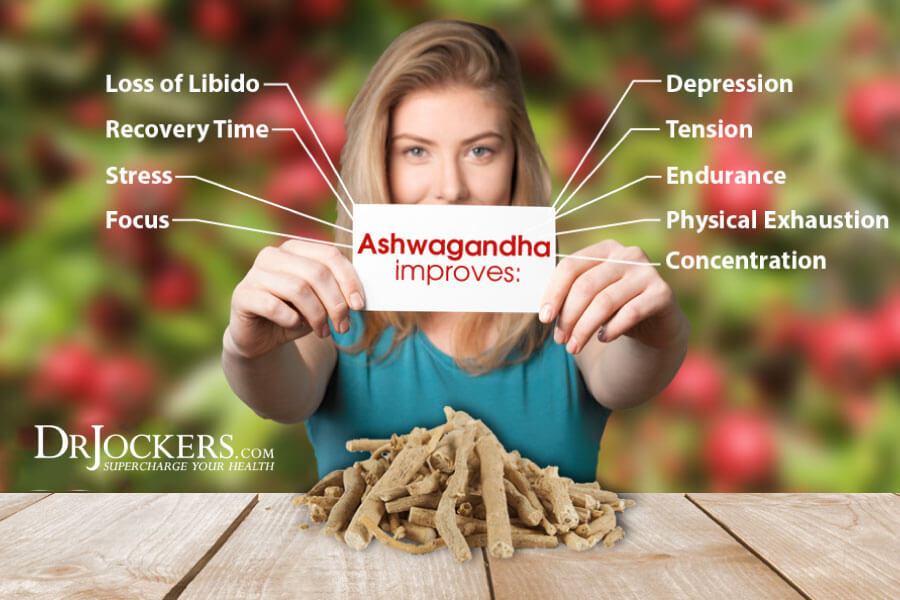
How to Take Ashwagandha
Most studies of ashwagandha use 300-500 milligrams of full-spectrum extract once or twice per day. Start by taking one capsule of the extract per day with a glass of water, in the morning, and consider adding a second dose later in the day based on your results.
According to one study, ashwagandha may increase thyroid hormone levels, so if you take thyroid medication or have hyperthyroidism, speak to your doctor before taking ashwagandha (9). We use a high quality ashwagandha along with other adaptogens in our Cortisol Defense product, which is great for calming the body, reducing anxiety, improving focus, and improving sleep quality. This is something I personally use every day to help me deal with the demands of my life.
#2: Chaga
Chaga is the common name for the fungus Inonotus obliquus. It occurs mainly in birch forests growing in the far north of the Northern Hemisphere. Medicinal use of chaga dates back to at least the 16th century in Europe, but may go as far back as Roman times.
Because of its high antioxidant content, chaga has a reputation as an anti-aging compound. The antioxidants also help explain its traditional use as a cancer-fighting medicine, which has recently been confirmed in mouse studies (10) (11).
Perhaps the most interesting property of chaga is that it may balance immune function. If you’re chronically stressed, your immune function can be compromised, but preliminary studies show that chaga might stimulate your immune system when you need to ward off illness (12) (13) (14).
There’s also some evidence that chaga may reduce the severity of food allergies and protect against DNA damage in inflammatory bowel disease (15) (16). If correct, these data points show that chaga can increase immune function when needed (to prevent illness), but also decrease it at other times as necessary (to reduce harmful autoimmune processes).
Research on this intriguing fungus is in its infancy, so most of the science thus far has focused on animal models and human cells. The full range of benefits of chaga remains to be discovered, but it’s definitely worth a try if you want to balance your immune system.
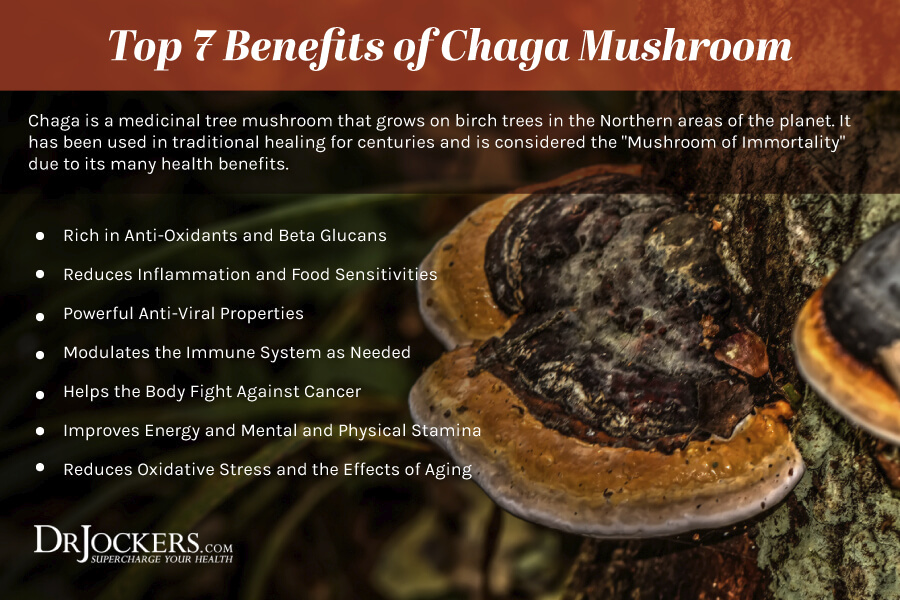
How to Take Chaga
You can buy chaga in the form of pills, powders, extracts, or tea. If you live in a northern latitude, you can even harvest chaga yourself! If you do, make sure you identify it correctly, then dry it out and ground it to a fine powder.
Common doses of chaga are 400-500 milligrams of extract, or one half to one teaspoon (about 1-2 grams) of non-extract powder. Try taking chaga one to three times per day when you want a gentle energy boost.
To make the tea, soak a teaspoon of dried chaga powder in cold water for an hour, then simmer it for an hour to extract all the beneficial compounds. It will taste earthy and slightly bitter, with a hint of vanilla. We have also partnered with Pique Tea on some very special adaptogenic products, so if you’re considering chaga, check out the great tea options we have created.
#3: Reishi
Reishi (Ganodermus lucidum) is a large, woody, fan-like mushroom that grows on living and dead trees. It has a long traditional history of promoting health and longevity in China, Japan, and other Asian countries (17).
Reishi is rich in protein, essential amino acids, and minerals like potassium, calcium, phosphorus, magnesium, selenium, iron, and zinc (17). In addition to a healthy variety of nutrients, this fungus also contains bioactive molecules called terpenoids, phenols, glycoproteins, and polysaccharides.
When you consume reishi, evidence suggests the nutrients and bioactive compounds may exert effects including:
- Causing apoptosis (induced death) of cancer cells (18)
- Reducing fatigue in breast cancer patients (19)
- Accelerating the clearance of oral human papillomavirus (HPV) (20)
- Reducing insulin and glucose levels (21)
A 2015 systematic review of the effects of reishi on cancer concluded it might complement modern cancer treatments due to its “potential of enhancing tumor response and stimulating host immunity” (22).
And a randomized, double-blind trial of patients with neurasthenia found that reishi significantly improved their fatigue and enhanced their well-being (23).
Neurasthenia is basically another word for the symptoms of chronic stress, so even if you don’t have cancer or immune issues, there’s a good chance reishi can help you deal with the stress of daily life.
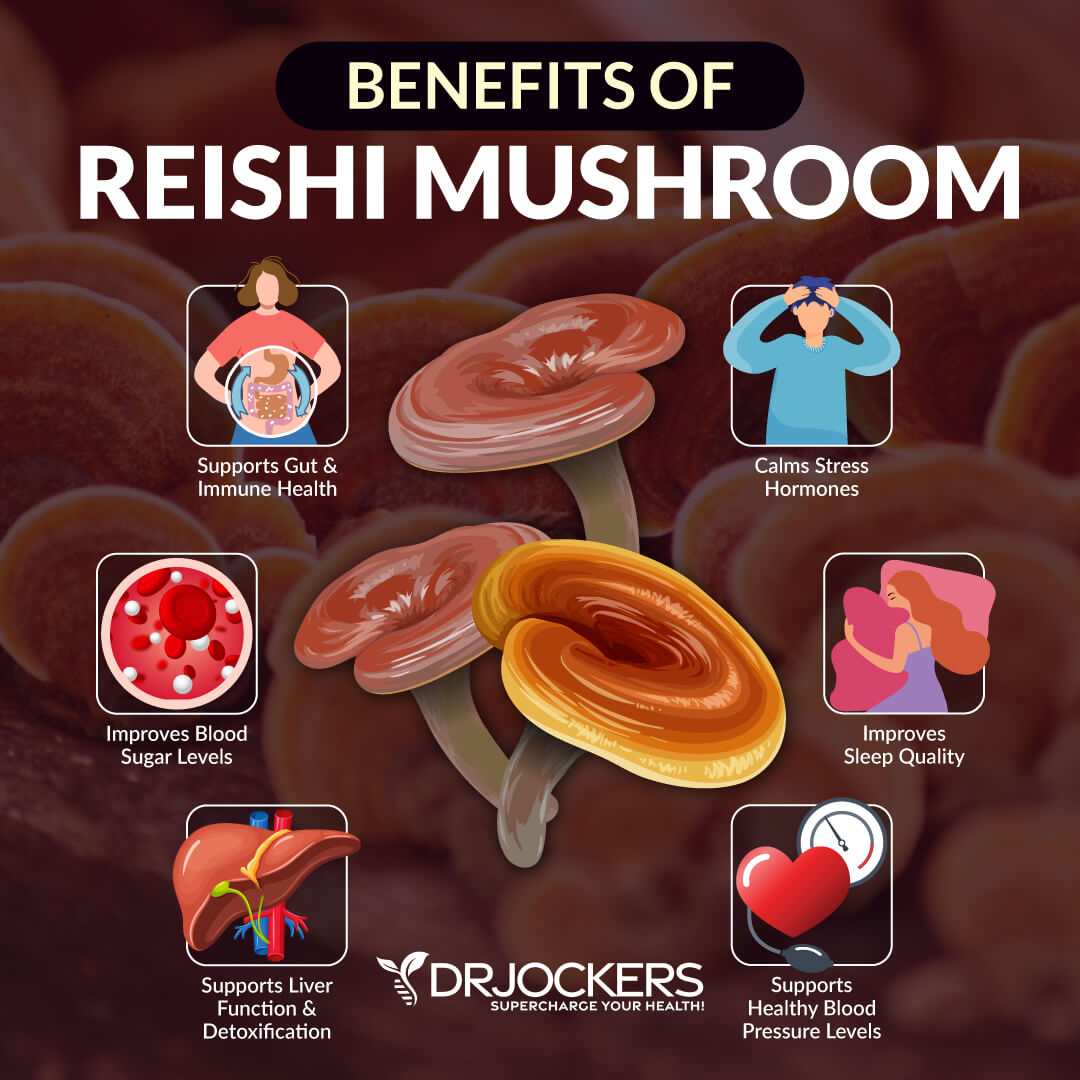
How to Take Reishi
If you want to boost your immune function or increase your vitality by taking reishi, you can buy it as a powder, extract, or tea.
Studies have documented the benefits of dosages ranging from approximately 1.5 grams to 4.5 grams of reishi powder per day (21) (23). Reishi is an excellent way to calm down and relax before bed, but you can take it anytime.
You can start with a single dose each day, then add more over time. If you purchase an extract, follow the directions on the product label. If you’re considering reishi, don’t miss this exclusive offer we have for our readers on some incredible teas to support your body.
#4: Tulsi (Holy Basil)
Tulsi, also called holy basil, is a fragrant herb that’s been a pillar of Ayurvedic medicine in India for millennia (24). Traditional uses of tulsi include reducing inflammation, healing skin conditions, as an antibacterial, and for aphrodisiac purposes (25).
Scientific research indicates that tulsi may have the following effects:
- Broad-spectrum antimicrobial activity (26)
- Antioxidant action (27)
- Wound-healing (26)
- Detoxification (26)
- Reducing blood sugar levels (28)
Additionally, a double-blind trial investigating the effects of tulsi in people with generalized anxiety disorder found that tulsi extract significantly reduced symptoms of anxiety, stress, and depression (29).
A separate study of healthy adults found that tulsi significantly improved their cognition and reduced their task error rates compared to a placebo (30). Eugenol, a naturally occurring compound in tulsi, is thought to be responsible for most of its medicinal properties (31).
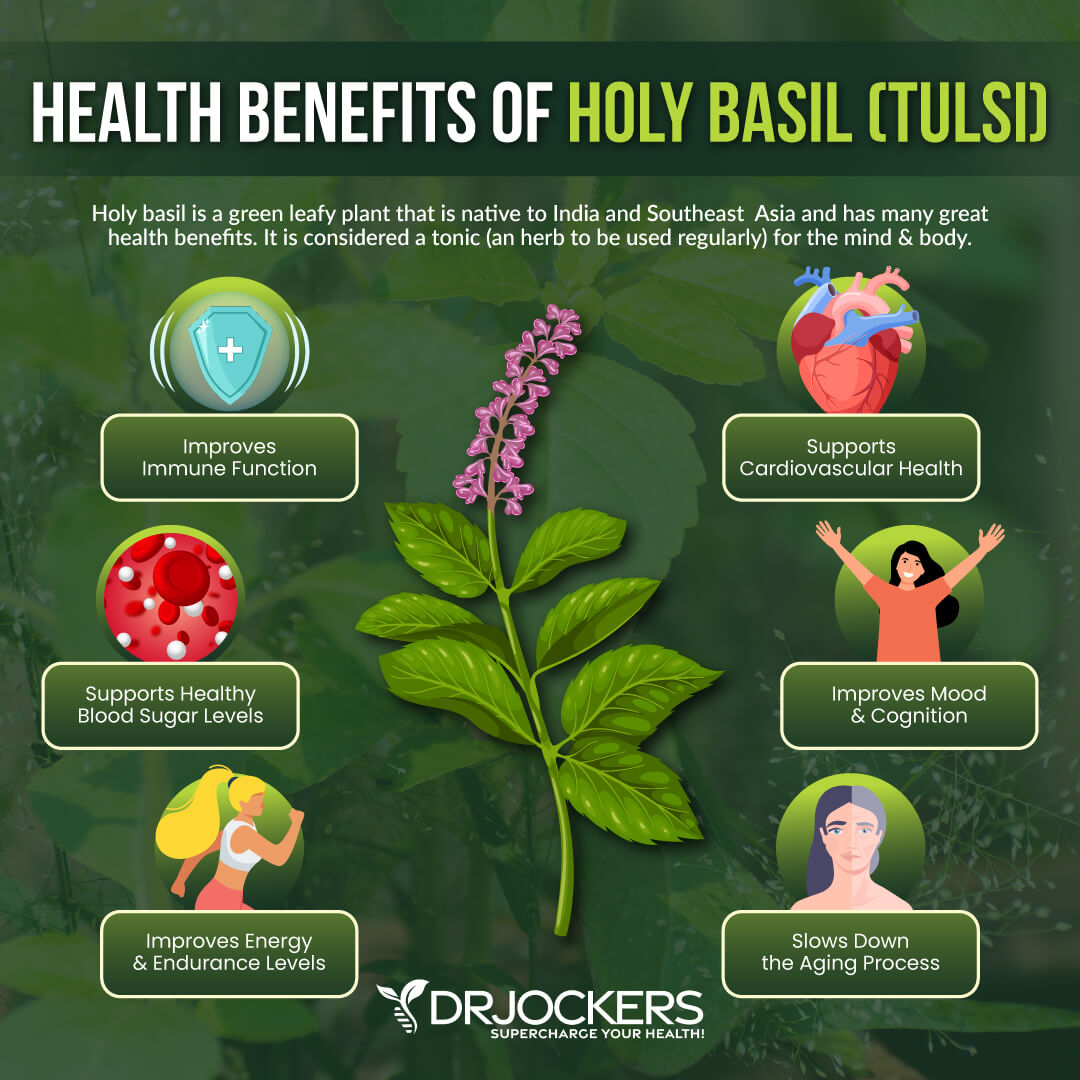
How to Take Tulsi
If you want to imbibe tulsi the traditional way, try making tea from fresh or dried tulsi. Simply boil a quart of water, then pour it over four to six tulsi tops (or a small palmful of the herb if you’re using dried tulsi). If you use fresh tulsi, harvest it ahead of time and allow it to wilt for a day before steeping.
Tulsi tea has a calming rather than stimulating effect–hence why it’s sometimes called “liquid yoga”–so you can enjoy it at any time of day or night (26).
If you’d rather skip the tea, you can buy tulsi extract in capsule form instead. A dose of 300-500 milligrams of extract twice per day is effective, according to research (30) (29).
#5: Rhodiola Rosea
Rhodiola rosea is a golden flower that grows wild in Arctic regions. The root of this plant is commonly used in traditional medicine systems for treating anxiety and depression. If you want an adaptogen that’s especially effective for mental stress, fatigue, and mood enhancement, rhodiola is a fantastic choice (32).
Numerous peer-reviewed studies suggest rhodiola is an effective adaptogen that can reduce stress and boost your mood. It seems to work by balancing cortisol, your body’s main stress hormone (33).
If you have too much cortisol in your bloodstream, you’ll feel wired and anxious, but if you have too little, you can feel burnt-out or fatigued. In 2008, a pilot study found that 340 milligrams of rhodiola extract per day for 10 weeks significantly improved the symptoms of generalized anxiety disorder in human participants (34).
In 2009, a study in the journal Planta Medica concluded that rhodiola extract “exerts an anti-fatigue effect that increases mental performance, particularly the ability to concentrate, and decreases cortisol response to awakening stress in burnout patients with fatigue syndrome”(35). And a separate 2013 study found that rhodiola can improve endurance exercise performance and decrease the perception of effort in athletes (36).
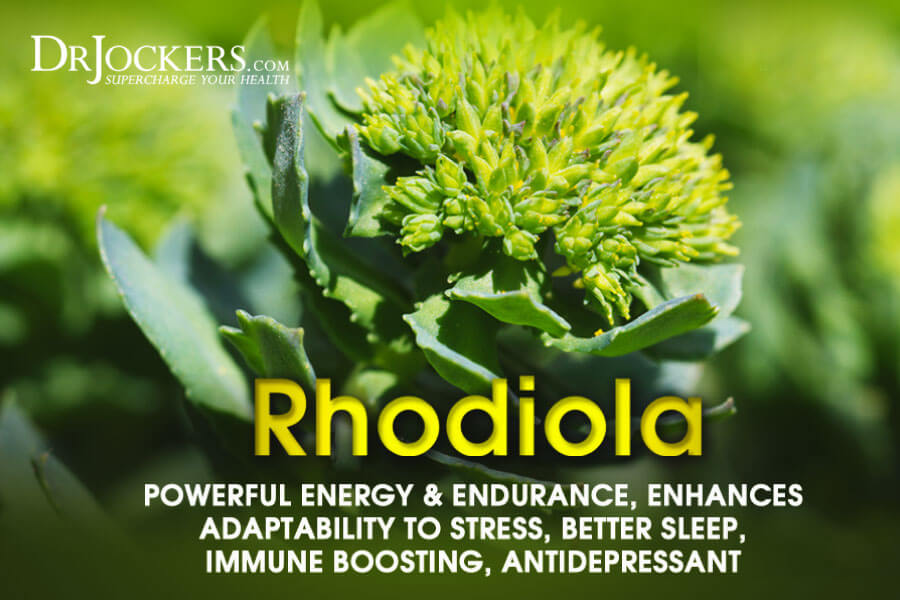
How to Take Rhodiola Rosea
Because dried rhodiola rosea can vary in potency, it’s smart to use a standardized extract. Published papers show that one or two doses per day of extract, totaling between 200-600 milligrams, is sufficient to obtain the benefits of this herb (36) (35).
As adaptogens go, rhodiola is fairly stimulating, so don’t take it before bed (37). We use Rhodiola in our Adapt Strong product which is fantastic for morning energy and and mental clarity to perform at your peak.

Bonus Adaptogen: Pique Tea TCM Elixirs
If you want to try adaptogens but aren’t quite sure where to start, consider Pique Tea’s elixirs. They’re inspired by Traditional Chinese Medicine, and the folks at Pique are unrivaled when it comes to their knowledge of TCM and adaptogens.
Unlike most adaptogenic products, these elixirs are specially formulated by TCM doctors for stress reduction and a gentle energetic and immune boost.
The formulas incorporate chaga and reishi along with other hand-picked herbs, fruits, and roots for support. Definitely give them a try if you are interested in better mental performance, sleep, or health and longevity.
Who Should Use Adaptogens?
Whether your focus is fitness, biohacking, productivity at work, or recovery from an illness, the stress-reducing and health-promoting effects of adaptogens are worth investigating firsthand.
Thanks to their non-specific effects, nearly everyone can benefit from adaptogens, but you should talk to your doctor before starting a new supplement, especially if you take prescription drugs or have a medical condition.
Adverse effects from adaptogens are rare, but may include:
Remarkably, in most studies of adaptogens, the placebo groups experience more side effects than those receiving the active compound! It’s unlikely you’ll notice these side effects when taking adaptogenic supplements, but if you do, you should stop your regimen and speak to your physician prior to resuming it.
If you’re pregnant or nursing, there’s not enough high-quality evidence to show that adaptogens are safe, so it’s best to steer clear temporarily.
Finally, make sure you purchase high-quality, organic, verified adaptogens from trusted sources. Because regulatory agencies like the Food and Drug Administration don’t actively monitor supplements for purity or authenticity, obscure or inexpensive brands may contain impure or fake ingredients (38).

Conclusion
While it’s possible to reduce your stress levels and improve your stress response, no one can avoid stress altogether. It’s simply a part of life, but stress doesn’t necessarily have to be a bad thing–if we can learn and grow from it.
To paraphrase Hans Selye again, “one should not try to avoid stress any more than one would shun food, love, or exercise.”
However, if you want to become more resilient to stress, adaptogens can be a very effective part of your strategy. Along with supplementation, don’t forget to adopt the proper mindset and use natural techniques to reduce your anxiety. Has this article inspired you to try adaptogens? Let us know in the comments!
Inflammation Crushing Ebundle
The Inflammation Crushing Ebundle is designed to help you improve your brain, liver, immune system and discover the healing strategies, foods and recipes to burn fat, reduce inflammation and Thrive in Life!
As a doctor of natural medicine, I have spent the past 20 years studying the best healing strategies and working with hundreds of coaching clients, helping them overcome chronic health conditions and optimize their overall health.
In our Inflammation Crushing Ebundle, I have put together my very best strategies to reduce inflammation and optimize your healing potential. Take a look at what you will get inside these valuable guides below!
Sources for this Article Include
-
Selye, Hans. The Stress of Life. McGraw-Hill, 1984. Link Here
-
Reflection Paper on the Adaptogenic Concept – EMA Link Here
-
Panossian A, Wikman G. Effects of Adaptogens on the Central Nervous System and the Molecular Mechanisms Associated with Their Stress-Protective Activity. Pharmaceuticals (Basel). 2010 Jan 19;3(1):188-224. doi: 10.3390/ph3010188. PMID: 27713248
-
Singh N, Bhalla M, de Jager P, Gilca M. An overview on ashwagandha: a Rasayana (rejuvenator) of Ayurveda. Afr J Tradit Complement Altern Med. 2011;8(5 Suppl):208-13. doi: 10.4314/ajtcam.v8i5S.9. Epub 2011 Jul 3. PMID: 22754076
-
Chandrasekhar K, Kapoor J, Anishetty S. A prospective, randomized double-blind, placebo-controlled study of safety and efficacy of a high-concentration full-spectrum extract of ashwagandha root in reducing stress and anxiety in adults. Indian J Psychol Med. 2012 Jul;34(3):255-62. doi: 10.4103/0253-7176.106022. PMID: 23439798
-
Choudhary D, Bhattacharyya S, Joshi K. Body Weight Management in Adults Under Chronic Stress Through Treatment With Ashwagandha Root Extract: A Double-Blind, Randomized, Placebo-Controlled Trial. J Evid Based Complementary Altern Med. 2017 Jan;22(1):96-106. doi: 10.1177/2156587216641830. Epub 2016 Apr 6. PMID: 27055824
-
Tomoharu Kuboyama, Chihiro Tohda, Katsuko Komatsu, Effects of Ashwagandha (Roots of Withania somnifera) on Neurodegenerative Diseases, Biological and Pharmaceutical Bulletin, 2014, Volume 37, Issue 6, Pages 892-897, Released on J-STAGE June 01, 2014, Online ISSN 1347-5215, Print ISSN 0918-6158, https://doi.org/10.1248/bpb.b14-00022 Link Here
-
Sengupta P, Agarwal A, Pogrebetskaya M, Roychoudhury S, Durairajanayagam D, Henkel R. Role of Withania somnifera (Ashwagandha) in the management of male infertility. Reprod Biomed Online. 2018 Mar;36(3):311-326. doi: 10.1016/j.rbmo.2017.11.007. Epub 2017 Dec 7. PMID: 29277366
-
Sharma AK, Basu I, Singh S. Efficacy and Safety of Ashwagandha Root Extract in Subclinical Hypothyroid Patients: A Double-Blind, Randomized Placebo-Controlled Trial. J Altern Complement Med. 2018 Mar;24(3):243-248. doi: 10.1089/acm.2017.0183. Epub 2017 Aug 22. PMID: 28829155
-
Lee IK, Kim YS, Jang YW, Jung JY, Yun BS. New antioxidant polyphenols from the medicinal mushroom Inonotus obliquus. Bioorg Med Chem Lett. 2007 Dec 15;17(24):6678-81. doi: 10.1016/j.bmcl.2007.10.072. Epub 2007 Oct 25. PMID: 17980585.
-
Arata S, Watanabe J, Maeda M, Yamamoto M, Matsuhashi H, Mochizuki M, Kagami N, Honda K, Inagaki M. Continuous intake of the Chaga mushroom (Inonotus obliquus) aqueous extract suppresses cancer progression and maintains body temperature in mice. Heliyon. 2016 May 12;2(5):e00111. doi: 10.1016/j.heliyon.2016.e00111. PMID: 27441282
-
Dhabhar FS. Effects of stress on immune function: the good, the bad, and the beautiful. Immunol Res. 2014 May;58(2-3):193-210. doi: 10.1007/s12026-014-8517-0. PMID: 24798553.
-
Kim YO, Han SB, Lee HW, Ahn HJ, Yoon YD, Jung JK, Kim HM, Shin CS. Immuno-stimulating effect of the endo-polysaccharide produced by submerged culture of Inonotus obliquus. Life Sci. 2005 Sep 23;77(19):2438-56. doi: 10.1016/j.lfs.2005.02.023. PMID: 15970296
-
Ko SK, Jin M, Pyo MY. Inonotus obliquus extracts suppress antigen-specific IgE production through the modulation of Th1/Th2 cytokines in ovalbumin-sensitized mice. J Ethnopharmacol. 2011 Oct 11;137(3):1077-82. doi: 10.1016/j.jep.2011.07.024. Epub 2011 Jul 28. PMID: 21820502
-
Nguyet TMN, Lomunova M, Le BV, Lee JS, Park SK, Kang JS, Kim YH, Hwang I. The mast cell stabilizing activity of Chaga mushroom critical for its therapeutic effect on food allergy is derived from inotodiol. Int Immunopharmacol. 2018 Jan;54:286-295. doi: 10.1016/j.intimp.2017.11.025. Epub 2017 Nov 24.
-
Najafzadeh M, Reynolds PD, Baumgartner A, Jerwood D, Anderson D. Chaga mushroom extract inhibits oxidative DNA damage in lymphocytes of patients with inflammatory bowel disease. Biofactors. 2007;31(3-4):191-200. doi: 10.1002/biof.5520310306. PMID: 1899728
-
Wachtel-Galor S, Yuen J, Buswell JA, et al. Ganoderma lucidum (Lingzhi or Reishi): A Medicinal Mushroom. In: Benzie IFF, Wachtel-Galor S, editors. Herbal Medicine: Biomolecular and Clinical Aspects. 2nd edition. Boca Raton (FL): CRC Press/Taylor & Francis; 2011. Chapter 9. Link Here
-
Gill BS, Navgeet, Mehra R, Kumar V, Kumar S. Ganoderic acid, lanostanoid triterpene: a key player in apoptosis. Invest New Drugs. 2018 Feb;36(1):136-143. doi: 10.1007/s10637-017-0526-0. Epub 2017 Oct 28.
-
Zhao H, Zhang Q, Zhao L, Huang X, Wang J, Kang X. Spore Powder of Ganoderma lucidum Improves Cancer-Related Fatigue in Breast Cancer Patients Undergoing Endocrine Therapy: A Pilot Clinical Trial. Evid Based Complement Alternat Med. 2012;2012:809614. doi: 10.1155/2012/809614. Epub 2011 Dec 10. PMID: 22203880
-
Donatini B. Control of oral human papillomavirus (HPV) by medicinal mushrooms, Trametes versicolor and Ganoderma lucidum: a preliminary clinical trial. Int J Med Mushrooms. 2014;16(5):497-8. doi: 10.1615/intjmedmushrooms.v16.i5.80. PMID: 25271984
-
Chu TTW, Benzie IFF, Lam CWK, Fok BSP, Lee KKC, Tomlinson B. Study of potential cardioprotective effects of Ganoderma lucidum (Lingzhi): results of a controlled human intervention trial. British Journal of Nutrition. 2012;107(7):1017-1027. doi:10.1017/S0007114511003795 Link Here
-
Jin X, Ruiz Beguerie J, Sze DMY, Chan GCF. Ganoderma lucidum (Reishi mushroom) for cancer treatment. Cochrane Database of Systematic Reviews 2016, Issue 4. Art. No.: CD007731. DOI: 10.1002/14651858.CD007731.pub3. Link Here
-
Tang W, Gao Y, Chen G, Gao H, Dai X, Ye J, Chan E, Huang M, Zhou S. A randomized, double-blind and placebo-controlled study of a Ganoderma lucidum polysaccharide extract in neurasthenia. J Med Food. 2005 Spring;8(1):53-8. doi: 10.1089/jmf.2005.8.53. PMID: 15857210
-
Mondal S, Mirdha BR, Mahapatra SC. The science behind sacredness of Tulsi (Ocimum sanctum Linn.). Indian J Physiol Pharmacol. 2009 Oct-Dec;53(4):291-306. PMID: 20509321
-
Thakur, R. N. et al. “Indian Traditional Shrub Tulsi (ocimum sanctum) Use in Medicine.” Imperial journal of interdisciplinary research 3 (2016): Link Here
-
Cohen MM. Tulsi – Ocimum sanctum: A herb for all reasons. J Ayurveda Integr Med. 2014 Oct-Dec;5(4):251-9. doi: 10.4103/0975-9476.146554. PMID: 25624701
-
Singh S, Taneja M, Majumdar DK. Biological activities of Ocimum sanctum L. fixed oil–an overview. Indian J Exp Biol. 2007 May;45(5):403-12. PMID: 17569280
-
Jamshidi N, Cohen MM. The Clinical Efficacy and Safety of Tulsi in Humans: A Systematic Review of the Literature. Evid Based Complement Alternat Med. 2017;2017:9217567. doi: 10.1155/2017/9217567. Epub 2017 Mar 16. PMID: 28400848
-
Bhattacharyya D, Sur TK, Jana U, Debnath PK. Controlled programmed trial of Ocimum sanctum leaf on generalized anxiety disorders. Nepal Med Coll J. 2008 Sep;10(3):176-9. PMID: 19253862
-
Sampath S, Mahapatra SC, Padhi MM, Sharma R, Talwar A. Holy basil (Ocimum sanctum Linn.) leaf extract enhances specific cognitive parameters in healthy adult volunteers: A placebo controlled study. Indian J Physiol Pharmacol. 2015 Jan-Mar;59(1):69-77. PMID: 26571987
-
Prakash P, Gupta N. Therapeutic uses of Ocimum sanctum Linn (Tulsi) with a note on eugenol and its pharmacological actions: a short review. Indian J Physiol Pharmacol. 2005 Apr;49(2):125-31. PMID: 16170979
-
Ishaque, S., Shamseer, L., Bukutu, C. et al. Rhodiola rosea for physical and mental fatigue: a systematic review. BMC Complement Altern Med 12, 70 (2012). https://doi.org/10.1186/1472-6882-12-70 Link Here
-
Panossian A, Wikman G, Sarris J. Rosenroot (Rhodiola rosea): traditional use, chemical composition, pharmacology and clinical efficacy. Phytomedicine. 2010 Jun;17(7):481-93. doi: 10.1016/j.phymed.2010.02.002. Epub 2010 Apr 7. PMID: 20378318
-
Bystritsky A, Kerwin L, Feusner JD. A pilot study of Rhodiola rosea (Rhodax) for generalized anxiety disorder (GAD). J Altern Complement Med. 2008 Mar;14(2):175-80. doi: 10.1089/acm.2007.7117. PMID: 18307390
-
Olsson EM, von Schéele B, Panossian AG. A randomised, double-blind, placebo-controlled, parallel-group study of the standardised extract shr-5 of the roots of Rhodiola rosea in the treatment of subjects with stress-related fatigue. Planta Med. 2009 Feb;75(2):105-12. doi: 10.1055/s-0028-1088346. Epub 2008 Nov 18. PMID: 19016404
-
Noreen EE, Buckley JG, Lewis SL, Brandauer J, Stuempfle KJ. The effects of an acute dose of Rhodiola rosea on endurance exercise performance. J Strength Cond Res. 2013 Mar;27(3):839-47. doi: 10.1519/JSC.0b013e31825d9799. PMID: 23443221
-
Spasov AA, Wikman GK, Mandrikov VB, Mironova IA, Neumoin VV. A double-blind, placebo-controlled pilot study of the stimulating and adaptogenic effect of Rhodiola rosea SHR-5 extract on the fatigue of students caused by stress during an examination period with a repeated low-dose regimen. Phytomedicine. 2000 Apr;7(2):85-9. doi: 10.1016/S0944-7113(00)80078-1. PMID: 10839209
-
Booker A, Jalil B, Frommenwiler D, Reich E, Zhai L, Kulic Z, Heinrich M. The authenticity and quality of Rhodiola rosea products. Phytomedicine. 2016 Jun 15;23(7):754-62. doi: 10.1016/j.phymed.2015.10.006. Epub 2015 Oct 31. PMID: 26626192








3 1/2 years ago I was diagnosed with DCIS and have changed my lifestyle. No glutinous, no dairy, no red meat, no processed food or chemicals, no cosmetics, organic personal care, ozone machine to washer so no laundry soap, no pesticides, sun blocks,… I went to a holistic doctor and did natural things like ozone and supplements and pulled root canal tooth. The cancer came back with a vengeance. It is now inflammatory which is very invasive. I am told time is of the essence. For inflammatory they do the big 3. What would you suggest?
Toni, I am so sorry to hear this!!! Here is a helpful article on what we suggest to get started with https://drjockers.com/beginning-cancer-healing-journey/
I would also recommend working with a functional health practitioner. Here is a helpful article https://drjockers.com/functional-nutrition-tips-to-find-a-great-health-coach/
are you sure you eliminated sugar? it is the benzine to cancer and tons of modern diseases
Cancer lies on the spectrum of auto immunity. Have you been tested for AI disease? If you have a AI condition, then the body will continue to weaken in immune response until you start to eliminate these trigger. Dr Jockers can help you here in this issue.
Thanks for sharing Gary!!
Hi
Great article. Would be nice if you had a synopsis of products with a list of your products with the cost, and a daily regimen.
Helps with ordering and correct protocol.
Many of us use supplements and organization and a sample schedule would be beyond helpful.
Wanted to order, but not clicking and then trying to write down what is spread through the article.
Good job Dr J, keep it up, I share with other health care pro’s.
Hey Cheryl, Thanks for sharing our site! I appreciate your kind words! We offer support packs with suggested regimens and have various protocols designed around specific health goals. However, every individual is different and unfortunately there isn’t a one size fits all approach for improving health. Be blessed!
Dr. Jockers,
I am reading your articles for a few years now and in addition to your kind and generous sharing of knowledge, I also appreciate the way you share it. Objective analysis, citing info resources, giving brief and practical summaries about products, putting info in easily accessible format. I really hate some of the naturists that post a long video trying for hours on end to scare you out of your wits with consequences of some action or some disease and then give a tiny stupid advice for free and entice you to buy a stupid report, which does not even have really new info or advice, as some of my friends did and were disappointed. While i am not in a position to buy any of your products now, i will di as soon as i can afford and i advise others to do it and share your messages with friends and colleagues. You are not thinking only of profit but also decreasing people s suffering and degradation of the environment. I wish you a lot of health and success to go on with your kind work!
Wow! Thank you so much Elena. My team appreciates your encouragement! Blessings!
Thanks so much for sharing your feedback Elena! Blessings to you!!
Hi, Dr. J…
Souldn’t licorice be on this list?
Thnx!
Licorice is not as good for stress reduction because it tends to be a bit stimulating! Still a great herb though!!
I grow three of these of course ashwaghanda is a root plant so if you are growing it you have to wait for the result. Rhodiaola also uses the root not sure if other parts are also used. Tulsi is a fast growing herb. Chaga Reishi Lions Mane and cordyceps are all very good. Does anyone on here know anything about essential thrombocythemia?. I was trying to research autophagy and this but I am not sure whether it would help or hurt. My brothers Dr wants to put him on interferon and another drug they use in sickle cell anemia. Please respond in comments or email me My email is adelia.hitt@hotmail.com
Hey Adelia, I am sorry to hear your brother. Every person is unique and working with a functional health practitioner can help customize a specific plan based off of his health journey.
Hello! Great article. I was wondering about Ashwaghanda and food allergies. Not sure what my husband is intolerant to so going to do a basic elimination diet to include nightshades as that is one of my hunches. I have read somewhere ashwaghanda is a nightshade – could that potentially be a problem. He and I are both on it and have seen good results. I personally get the same results than when I was on prescription meds so I love it. I do take a week or so’s break on it from time to time…. is that also smart?
Yes ashwaghanda is a nightshade, although I haven’t seen people have issues with it. However, if you are suspicious you can take it out and see if he responds and improves. You can also cycle it like you are discussing.
Thank you for this article. Gives us information we don’t readily find elsewhere. My daughter is on a lot of prescription medications. Would it be possible when you write these articles that you could mention if they may be a problem with certain medications, that would really help. I share your articles with my kids and hope they read them!
Hey Joan,
Thanks for your feedback. Fortunately with adaptogens there is no issues with taking them with prescription meds. However, we always caution to start small and work with your health care practitioner when implementing new health strategies. Blessings!
Congratulations Dr. Jockers a great article
A great article and generally I love the way you explain even tough medical facts in a way, that non-medics can understand them!!!
Usually at the end of an article you give a list of the used sources, including studies, etc. but in this article you only count the links, but I could not find a list at the end of the article.
Would it be possible to get the list of the used source?
Thanks a thousand in advance!
Greetings and God bless from Germany,
MARTIN